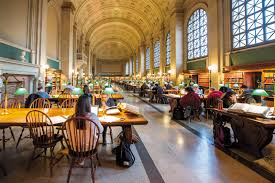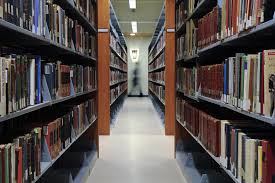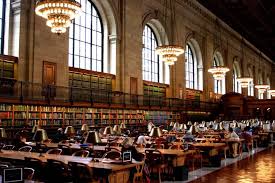
In the town where I grew up outside of Los Angeles, the public library would send a woman to ring your doorbell if you were delinquent in returning overdue books. She was perky and neighborly and had a kind smile. I remember my mom searching for a book, which she’d uncharacteristically forgotten, and apologizing as she handed it over to the friendly deputy.
My relationship with libraries is deep and affectionate, and I feel a strong sense of offended justice when I see library books that people have defaced or underlined or otherwise mistreated. What’s even worse is people who check out books and never return them.
I can’t imagine that happening today, what with libraries suffering budget cuts and people feeling afraid to open their doors to strangers. But I’m glad I grew up in a time when that practice existed, because it reinforced for me the sense that libraries are special places built on democratizing principles; that reading is salvation and a gift; that library books are public property and not meant to be hoarded.
In my home town of West Covina there was a little library in a storefront across from the Presbyterian Church. I remember the slightly musty smells, the hushed and polite ambience, the peaceful, engaged faces of the patrons. I could sit down right now and draw you a floor map of all the bookcases, tables and chairs. I remember checking out Harriet Beecher Stowe’s Civil War classic Uncle Tom’s Cabin when I was 7 or 8, much to the librarian’s astonishment, and then not being able to read it because the language was so dated.
 When I was 10 or 11, the city built a new, much-larger library near the city hall and police station. This was a big deal, civic-wise. There must have been five times as many books at the new facility. I discovered the periodicals section where newspapers were draped on slotted poles and arranged horizontally in racks. I would pull the Sunday New York Times and feast on the Arts & Leisure section with its news on Broadway shows and foreign films – a cherished window into a world of sophistication that from West Covina seemed awfully remote. They even had a large record section, where I discovered Bizet’s Carmen sung by Leontyne Price — my introduction to opera.
When I was 10 or 11, the city built a new, much-larger library near the city hall and police station. This was a big deal, civic-wise. There must have been five times as many books at the new facility. I discovered the periodicals section where newspapers were draped on slotted poles and arranged horizontally in racks. I would pull the Sunday New York Times and feast on the Arts & Leisure section with its news on Broadway shows and foreign films – a cherished window into a world of sophistication that from West Covina seemed awfully remote. They even had a large record section, where I discovered Bizet’s Carmen sung by Leontyne Price — my introduction to opera.
One day – I think I was 12 – I found a book on the making of The Misfits, the last movie for both Marilyn Monroe and Clark Gable. The clerk at the check-out counter was a clenched-tight scold and she refused to check the book out to me. I found my mother in another part of the library and without missing a beat she walked me back to the check-out counter and asked the clerk to explain herself. “Well, it’s The Misfits!” the woman said as if the title alone could lead a young reader to filth and degradation. “He’s not old enough for that.”
“My son reads at an adult level,” my mother said, “and you have no right to refuse to check out this or any other book to him.” She was indignant and fired-up that afternoon, qualities she rarely evinced, and I remember the surprised charge I felt as she brilliantly defended my civil rights and put the tight-assed prude in her place. My mother prevailed and I took that book home. But I found nothing even slightly raunchy in it — just gossip about Marilyn’s personal demons and on-set tardiness.
Going to the library was always an occasion, something my mom, younger brother and I seemed to enjoy equally. Since West Covina was spread out and lacked public transportation, I was dependent on my mother to drive me. I often checked out multiple books and ended up not reading most of them. I read my first “grown-up book,” To Kill a Mockingbird, in seventh grade, fell in love with Pearl S. Buck’s The Good Earth in tenth grade and was dazzled by early installments of Truman Capote’s In Cold Blood in The New Yorker — read aloud by my high-school journalism teacher Mrs. Schneidewind.
 In college, I scored a job at the campus library and worked at the check-out counter. A dream job. I loved getting a behind-the-scenes view of library operations, loved the voyeuristic pleasure of seeing which books and magazines various people checked out. When I took a Shakespeare class I discovered the library’s large collection of plays on vinyl. You could rent a headset, schedule time at a turntable and hear Laurence Olivier and Maggie Smith performing Othello or Richard Burton anguishing his way through Hamlet. With money earned working at that library, I financed my first summer-long trip to Europe.
In college, I scored a job at the campus library and worked at the check-out counter. A dream job. I loved getting a behind-the-scenes view of library operations, loved the voyeuristic pleasure of seeing which books and magazines various people checked out. When I took a Shakespeare class I discovered the library’s large collection of plays on vinyl. You could rent a headset, schedule time at a turntable and hear Laurence Olivier and Maggie Smith performing Othello or Richard Burton anguishing his way through Hamlet. With money earned working at that library, I financed my first summer-long trip to Europe.
My relationship with libraries is deep and affectionate, and I feel a strong sense of offended justice when I see library books that people have defaced or mistreated. What’s even worse is people who check out books and never return them. In college I was in the home of a spacey hippie named Laurel and commented on the due date in the handsome art book she’d taken from the campus library. “Oh yeah,” she said with an airy, indifferent shrug. “I liked it so much I decided to keep it.” How I wish I’d surreptitiously rescued that book and returned it to the library.
Years later, I found a months-overdue San Francisco Public Library book in my friend Marshall’s apartment. It was A Little Original Sin, Millicent Dillon’s excellent biography of the fiction writer Jane Bowles. I was crazy for that book, and the fact that Marshall was selfishly hoarding it and denying other people the joy of reading it was criminal to me. Criminal and appalling. I told him that, probably more vociferously than I needed to, and then picked up the book and walked out.
Today, I use my neighborhood library constantly. I read three or four books each month, most of them library books. I check out music and movies on DVD, and frequently go to oaklandlibrary.org to put a hold on a book, renew a book, or just peruse the variety of titles available from certain authors (lately I’m obsessed with Steinbeck). I have my gripes: Libraries aren’t nearly as quiet as they were when I was a kid, and often become day care centers for the stroller brigade of exhausted nannies and rowdy toddlers. There’s also an absence of professional comportment among library workers: You see employees in T-shirts and jeans looking like they just came off the soccer field. Even the branch manager at my neighborhood library wears his shirttail out. Yep, I’m old-school: I respect libraries and I think the people who operate them should dress professionally.
 Last year I read Susan Orlean’s The Library Book, a wonderful study of the Los Angeles Public Library’s downtown facility: how in 1986 it suffered a massive, seven-hour fire that destroyed over a million books; how it recovered and today serves an amazingly wide demographic, including a large homeless population; how it adapts to changing times and continues to redefine the social, educational and spiritual functions of a public library.
Last year I read Susan Orlean’s The Library Book, a wonderful study of the Los Angeles Public Library’s downtown facility: how in 1986 it suffered a massive, seven-hour fire that destroyed over a million books; how it recovered and today serves an amazingly wide demographic, including a large homeless population; how it adapts to changing times and continues to redefine the social, educational and spiritual functions of a public library.
Like me, Orlean formed her deep connection to libraries at a young age, starting with regular visits with her mother. I’ve always admired Orlean’s writing and The Library Book is one book I earnestly wish I had written myself. It’s graceful and passionate and it captures so beautifully the magic of libraries and the deep, abiding gratitude that library devotees like myself feel throughout our lives.



Bravo Edward, you’ve really conveyed your library affection and connection, and your wonderful recall of the books you read as a kid.
A friend just gifted me with a copy of The Library Book knowing that as a retired librarian I’ll surely love it!
And BTW anecdotally it seems the worse offenders in absconding with library books are theology students – maybe because they can’t afford to buy books as they’re usually as poor as church mice!
Thanks, Dana. So you worked as a librarian. That’s one of the professions I probably would’ve liked had I not become a journalist.
Where are you Edward, and where have you worked as. journalist?
And still working or enjoying a leisurely retired life?
Twenty five years at the San Francisco Chronicle. Still writing, occasional freelance pieces.
Edward, this is a beautiful story! There are so many things in it to love! The woman who rang your doorbell if you had overdue books. Your mother insisting they let you check out a book on The Misfits. Listening to Shakespeare on records with a headset. Your campaign to retrieve books that friends never bothered to return. Thanks for sharing so many wonderful library anecdotes.
And thanks for listing all the ways you currently use the library, which are true for me too. We used to get movies on videotape, and ended up cleaning most of them with a special tape cleaner because otherwise they would skip. It was a big improvement when they switched to DVDs. And I agree with your gripes too. But at least all those noisy nannies and toddlers are using the library!
In this electronic age, while my library doesn’t send a staff member out to retrieve overdue books, it does send an email reminder 3 days before a book is due, and I’m guessing (although I haven’t tested it), that they would send another one after the due date has come and gone.
Thanks so much for your kind and generous comments. Writing this piece came easily and quickly to me, I guess because these stories and my relationship with books and libraries and bookstores are so important to me. I also get electronic reminders when library books are due, and often the the library will automatically renew books for me that don’t have holds on them.
What a wonderful history of your love affair with libraries and the books contained therein. I love that your town had an employee devoted to going door-to-door to collect delinquent library books. What a spectacular resource!
My brother’s senior year at Brandeis (1969), he worked in the Reference Room of the library, where books could be looked at, but not checked out. This was a year of great campus unrest across the country. A number of African-American protestors came and threw many books off the shelves onto the floor as an act of protest, and (wow, what were the odds?), a Boston Globe photographer showed up on cue. My brother’s photo was on the front page of the paper the next day, re-shelving the books.
Libraries have adapted to the times and now are great civic centers, having other sorts of programming, as well as offering books and movies on tape and DVD, as you point out. The continue to draw us in, even while the market contracts. I am glad that your love affair continues.
Thanks, Betsy!
Oh, Edward Guthmann, this is a wonderful essay, filled with your passion and love. Libraries are your cathedrals, your places of spiritual restoration. And you are a great defender of this love. Your mother was completely inspiring as a warrior for intellectual inclusiveness for her young son. And look at the result. This should be required reading for every teacher and librarian. Thank you.
Thanks, Maura!
Edward, I have followed your lead and started making better use of our local library! I loved reading about your mother sticking up for you. My parents also supported me when I checked out books that may have been over my head. Your love of books and reading is as strong today as it ever was, and I always enjoy our “what are you reading” conversations. Full disclosure: when my daughter was a little girl I took her to see Beverly Cleary when she came to Berkeley. We brought along her Ramona diary and a copy of one of Cleary’s books from the library. We asked her if she would sign the book as a surprise for the next reader. She did. I always wonder what that reader’s reaction was when they saw what she wrote!
Great story, Edward, and I love the part about your mother standing up to the prissy librarian about a book too “adult” for you. My mom did the same when I read at an adult level at age 10 and wanted out of the children’s room in the library. I carried a note in my pocket giving me special permission to check out those adult books.
Yes, my mom was heroic that day. Thanks for the kind words.
I’m so glad you gave a plug for The Library Book at the end of your story. I enjoyed it and think it would be perfect for all of the library-loving Retrospecters. I love your tribute to libraries, Edward. They have a much tougher role to fill these days. Ours is a refuge for the homeless and a computer lab for those in our community not fortunate to have computers in their homes. Thanks for sharing your love for libraries and books.
Thanks, Laurie!